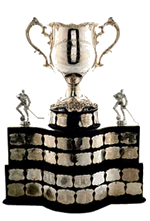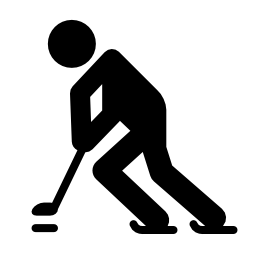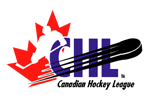Canadian Junior Hockey 1968 - 69 Memorial Cup
 |
1969 MEMORIAL CUP
Regina Pats vs. Montreal Junior Canadiens
at Montreal (Forum) and Regina (Exhibition Stadium)
Once again, the politics of junior hockey played a role in determining a Memorial Cup champion.
Unable to see eye-to-eye with the CAHA, the Western Canada Junior Hockey League bolted once again, choosing to operate independently.
Three teams -- the Regina Pats, Moose Jaw Canucks and Weyburn Red Wings -- didn't agree with the move and returned to the security of the Saskatchewan Junior Hockey League.
The WCJHL changed its name -- this time to the Western Canada Hockey League -- and operated with eight teams, rather than the 11 of the previous season.
Ironically, one of the teams that left the WCHL -- Regina -- would represent western Canada in the Memorial Cup final.
The Pats, under head coach Bob Turner, who had five Stanley Cup titles under his belt as a defenceman with the Montreal Canadiens, featured goaltender Gary Bromley, defenceman Barry Cummins, and forwards Laurie Yaworski, Ron Garwasiuk, who had played with the Estevan Bruins in the 1968 Memorial Cup final, Larry Wright and Don Saleski. Also here was forward Bob Owen, who would go on to coach the Regina Pat Blues of the SJHL and then move into the NHL scouting ranks.
Regina won the SJHL championship by ousting Moose Jaw in four games and Weyburn in six.
Entering into interprovincial play, the Pats took six games to sideline the Lethbridge Sugar Kings and then went seven games in the Abbott Cup final with the Manitoba Junior Hockey League's Dauphin Kings. Regina had held a 3-1 lead in games over Dauphin, only to have the Kings pull even at 3-3 by winning a sixth game 3-2 in overtime.
It's of interest that the Estevan Bruins, even though they were members of the WCHL and therefore not eligible for Memorial Cup play, were making some noise here. You see, the Bruins were the defending Abbott Cup champions and their coach, Ernie (Punch) McLean, was heard to say that he wasn't about to give up the Abbott Cup without a fight.
McLean's reasoning? He said the Abbott Cup was a challenge trophy and that no one had challenged the Bruins for it.
(When the Pats finally won the west, the Abbott Cup wasn't anywhere to be found. And it wouldn't turn up for a year, at which time some people would say it had been missing for two seasons, while others would claim it hadn't been seen for three years.)
No matter. The Pats beat hometown Dauphin, and goaltender Ron Low, 4-3 in the seventh game before 3,194 fans, defenceman Gord Redden's goal at 11:18 of the third period standing up as the winner. Redden, whose son Wade would make two Memorial Cup appearances with the Brandon Wheat Kings in the 1990s, had been added to the Pats' roster from Weyburn after the Red Wings were sidelined. The crowd included quite a few Reginans, who were able to get return bus fare and a game ticket for $10.
One other item of note from the Dauphin-Regina series: Dauphin management brought in Kelly Sveinson, a specialist from Winnipeg, to spend up to three hours a day working with the team on the powers of positive thinking.
Turner, for one, wasn't impressed.
"I do the positive thinking for this club and we don't need anyone from outside to come in and tell us how good we are,” the Pats coach said.
Afterwards, Regina added three Kings -- centre Butch Goring, left-winger Dennis Schick and defenceman Bob Neufeld -- for the Memorial Cup series. Goring, Dauphin's best player, suffered a separated shoulder in the final seconds of the sixth game of the Abbott Cup final and didn't play for the Pats until the third game of the national final. Prior to the series with Dauphin, the Pats had added four Weyburn players -- Redden, centres Murray Keogan and Ross Butler and goaltender Wayne Bell -- and right-winger Doug Kerslake from Moose Jaw.
As it turned out, the Pats were no match for the Montreal Junior Canadiens, of coach Roger Bedard, a team that boasted the likes of Guy Charron, Rejean Houle, Marc Tardif, Richard Martin and Gilbert Perreault, along with goaltenders Wayne Wood and Jimmy Rutherford, the latter a playoff addition from the Hamilton Red Wings.
Houle, a right winger, had won the Ontario Junior Hockey League scoring title, with 108 points, including 53 goals, in 54 games. In the playoffs, he had added 19 goals and 10 assists. Perreault, in the regular season, had scored 97 points, including 60 assists. They played on a line with Bobby Guindon on the left side.
The second line featured Bobby Lalonde between J.P. Bordeleau and Tardif. Tardif, who was just starting to mature into a superb player, followed up a 72-point regular season with 22 goals and 19 assists in the playoffs.
And there was the Kid Line -- Richard Lemieux between Norm Gratton, the right winger, and Charron, who had 54 points, including 27 goals, in the regular season.
The defence was keyed by Jocelyn Guevremont, Serge Lajeunesse and Andre Dupont. Claude Moreau and Gary Connelly also patrolled the blue line.
Montreal had gone through four playoff series before reaching the Memorial Cup final.
In league play, the Junior Canadiens eliminated Hamilton in a best-of-seven series -- without overtime they were sometimes called eight-point series -- that lasted five games. Montreal won three games and two were tied. The Junior Canadiens then swept the Peterborough Petes in four games, to advance against the St. Catharines Black Hawks in the final -- a series they won in five games to claim the Robertson Cup as OJHL champions.
That moved them into the best-of-five eastern Canadian final against the Sorel Eperviers, a team coached by Ken Hodge, then 21 years of age. Hodge, who would go on to earn 742 coaching victories in the WHL, had suffered a career-ending eye injury two seasons previous while with Moose Jaw. At 21, he may well have been the youngest fulltime junior hockey head coach in history.
Montreal won the George C. Richardson Trophy as eastern Canadian finalists by taking out Sorel, 3-1 in games.
The Junior Canadiens were gunning for their city's first Memorial Cup since 1950. The Montreal Royals had won it in 1949, the Junior Canadiens won it in '50.
The Pats, who hadn't been in the national final since 1958, hadn't won it all since 1939.
The two teams had met earlier in the season in Regina, with Montreal winning, 5-2.
The series opened on April 30 in the Montreal Forum where, including playoffs, the Junior Canadiens were 32-2-3.
Charron scored three times as the Junior Canadiens won 5-3 before a crowd of 8,821. (Attendance was not what had been expected, and it was speculated that the fact the Montreal Expos were playing their first night game of the National League baseball season may have had something to do with that.)
It was the first time this playoff season that Regina had trailed in a series.
Tardif and Perreault scored Montreal's other goals. Keogan, with two, and Wright scored for the Pats, who trailed 5-1 before scoring two late goals.
Bromley turned aside 40 shots, 20 of them in the third period. At the other end, Rutherford was spectacular, stopping 32 shots.
Toe Blake, coach of the NHL's Montreal Canadiens, was heard to say that the Junior Canadiens were fortunate to have Rutherford in goal, especially in the first period when the Pats dominated play.
"The Pats deserved a better fate than a 3-1 deficit after two periods of hockey,” stated New York Rangers general manager-coach Emile Francis.
The Pats spent the next afternoon, an off day, watching the Montreal Expos play the New York Mets at Jarry Park.
The Junior Canadiens wrapped up their home portion of the series with a 7-2 victory in front of 10,862 fans on May 2.
Guindon scored twice for the Baby Habs in a game marred by a third-period bench-clearing brawl sparked by a scrap between Dupont and Regina's Gary Leippi. In the end, only six players from each team weren't given game misconducts.
Perrault, Charron, Gratton, Lemieux and Arthur Quoquochi added Montreal's other goals. Regina got its goals from Saleski and Garwasiuk.
Montreal took a 2-0 lead into the second period, only to have Regina tie the score. But Charron's goal late in the second period gave the Junior Canadiens a 3-2 lead and the Pats weren't able to recover.
Had it not been for the play of Rutherford, however, Regina may have been off and running. The Pats threw 15 shots at Rutherford in the first period and 18 more in the second, but could only score twice.
The brawl began with an altercation between Dupont and Leippi. Before you knew it, there were seven more scraps taking place.
Then, just when it seemed calm had been restored, Rutherford, who had gone to the bench in favor of Wood after Montreal's final goal, chose to go after Bromley, who was taking in the proceedings from near the Pats' bench. That resulted in both teams dumping their benches and it became a full-scale donnybrook.
After the game, never mind the scraps, both teams boarded the same charter flight and headed for Regina, landing around 3 a.m.
The series resumed on May 4 before 5,120 fans at Regina's Exhibition Stadium.
Only the location changed, however, as the outcome was the same.
Lalonde, a 17-year-old in his first season, scored four times as Montreal won 5-2 to close to within one victory of the national title. Lalonde had six shots on goal in the game; his goals came on his first four shots.
Tardif had Montreal's other goal. Butler and Goring scored for Regina.
"You can't score goals if you don't shoot the puck,” Turner said. "You can't take anything away from Canadiens; they're a real good club, but our guys continually tried to work in too close. (Montreal) played better as a team here than in Montreal and they backchecked harder than they did in the previous two games.”
Bedard agreed, saying: "We played much better as a unit than we did in the first two games.”
Bedard also had a bit of praise for Lalonde.
"He played really well,” Bedard said, "but if it hadn't been him, it would have been someone else. This has been a rotating club all year, first one player stars and then another.”
By now, Turner knew the writing was on the wall.
"John Statz and Barry Cummins played steady,” he said, "but you could have thrown a blanket over the rest. We're going to need a better effort out of all our own guys. A couple of our pickups played well, but the rest were terrible.”
Goring played his first game since being injured in Game 6 of the western final. Turner felt he played well, although his conditioning was obviously lacking.
Montreal wrapped it up the next night with an 8-6 overtime victory, scoring twice in a 10-minute extra period before 4,500 fans.
Charron scored twice, including the first goal in overtime, at 2:06, while Dupont also had two goals. Gratton scored the other overtime goal, just 52 seconds after Charron found the range. Singles came from Martin, Quoquochi and Tardif. Charron finished the series with six goals.
Regina, which built up a 5-1 lead before fading, got two goals from each of Saleski and Goring, with Garwasiuk and Statz adding one each. Goring played only the last two games, but totalled three goals and two assists.
The Pats led 5-3 when Martin scored at 6:05 of the third period. Saleski got that one back five minutes later.
The overtime was forced on goals by Tardif (14:02) and Dupont (15:19).
Charron's winner came when he broke free at the Montreal blueline and beat Bromley on the breakaway.
Turner pointed to a Montreal line (Perreault between Tardif and Houle) as the difference. "When Bedard put those three together they dominated the play,” Turner said.
Ironically, on the same night the Junior Canadiens were winning the Memorial Cup, the Flin Flon Bombers were winning the first championship of the Canadian Hockey Association.
The Bombers, ahead 3-1 in a best-of-seven final with St. Thomas, Ont., were leading the Barons 4-0 in Game 5 in Flin Flon when the visitors left the ice midway in the second period.
The walkout happened following several fights, after which St. Thomas manager Jack Cassidy said his club wouldn't continue the series.
NEXT: 1970 (Weyburn Red Wings vs. Montreal Junior Canadiens) The Memorial Cup was originally known as the OHA Memorial Cup and was donated by the Ontario Hockey Association in March, 1919. Initially the Cup was awarded to the national junior hockey champions of Canada. Later on it came to signify Junior 'A' hockey supremacy when in 1934, junior hockey in Canada was divided into 'A' and 'B' classifications. In 1971, junior 'A' hockey was divided once again to form a major junior and a Tier 'II' level. The Memorial Cup was awarded to the higher category. In 1972, a round-robin tournament format replaced the old play-down system to determine the champions. Since then, the champions of the Western Hockey League (WHL), the Quebec Major Junior Hockey League (QMJHL) and the Ontario Hockey League (OHL), along with a host club, have met each spring in a round-robin series with the two top teams playing off in a sudden-death game to determine the Cup champions. |
Canadian Junior Hockey 1968 - 69 Memorial Cup Games
Wednesday April 30, 1969 - Montreal 5 Regina 3Friday May 2, 1969 - Montreal 7 Regina 2
Sunday May 4, 1969 - Montreal 5 Regina 2
Monday May 5, 1969 - Montreal 8 Regina 6
Canadian Junior Hockey 1968 - 69 Memorial Cup Winning Roster
1969 - Montréal Junior Canadiens - Jean-Pierre Bordeleau, Guy Charron, Gary Connelly, André Dupont, Jocelyn Guévremont, Robert Guindon, Normand Gratton, Réjean Houle, Serge Lajeunesse, Robert Lalonde, Richard Lemieux, Richard Martin, Claude Moreau, Gilbert Perreault, Arthur Quoquochi, Jim Rutherford, MarcTardif, Ted Tucker, Wayne Wood, Phil Wimmer (manager), Roger Bédard (coach).
 Rauzulu's Street
Rauzulu's Street Hockey Section
Hockey Section